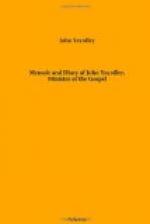When on arriving here we found there were no letters, and that probably they were sent to Corfu, my heart sank within me. We have, however, been since cheered by receiving a very kind letter from dear Robert Forster; nothing could have been more in season than this token of remembrance.
Finding no suitable vessel for Corfu, with the assistance of their Greek friend they hired a lodging, and gave their time to the study of Italian and the Modern Greek. Religions labor was hardly to be thought of; the government of the town and every public office was under the direction of the Roman Catholic priests, of whom there were more than 400. However, they were enabled to hold improving intercourse with some individuals, mostly Greeks; “for whom,” says Martha Yeardley, “we felt much interest, and some, I believe, became attached to us; we gave them a few books.”
Before commencing with their visit to the Ionian Islands, it will be interesting to glance at the circle of Friends whom they had left in England. From the letters which have been preserved, we select the following extract: the first is from the pen of one who may be described as sound in heart and understanding, of extensive knowledge and large Christian charity.
Scarborough, 10 mo. 16, 1833.
MY DEAR FRIENDS.
Accept my grateful acknowledgments, and through me those of all your friends in this neighborhood, for the copies which I have received of your interesting journals. It is indeed a cause of rejoicing to us that you have been so favored in meeting with so many pious persons with, whom you could hold Christian fellowship, and among whom there is strong reason for believing your labors have not been in vain. It is to me very gratifying that you feel and exercise so much Christian freedom in mingling among persons of various denominations, whom, though owing to education and to various circumstances, they may differ considerably in opinion on subjects of minor importance, yet conscious of one common disease—that of sin, and looking for or experiencing the only remedy—reconciliation with God through one Saviour,—you can salute as brethren and sisters in the truth, and feel your spirits refreshed whilst you enjoy the privilege of refreshing theirs; and like Aquila and Priscilla, with Apollos, are made the instruments, I trust, of “expounding unto them the way of God more perfectly.” My dear mother thinks that the persons you meet with must be more spiritually-minded than Christians in this country. They have, perhaps, from external circumstances, experienced deeper baptisms, and have made greater sacrifices, than many amongst us have been called upon to make; and we know that ease and outward prosperity have not been favorable to the interests of the true Church: but, without doubt, they are exposed to similar dangers to those in this land whose minds have been awakened to the importance of religious truth.
After speaking of a journey which he had made with Samuel Tuke and Joseph Priestman for re-arranging some of the Monthly Meetings in the West Riding, the writer continues:—




